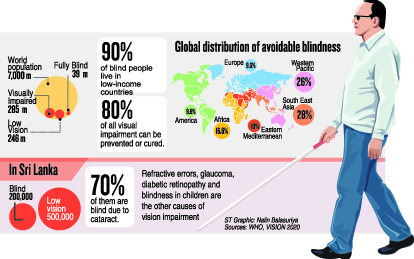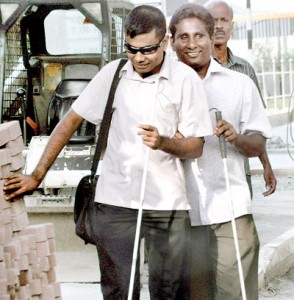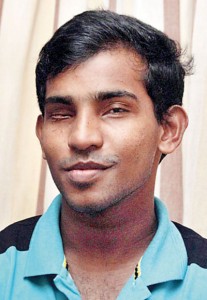News
Authorities blind to needs of disabled
For Suraj Priyadarshana the daily journey from Ratmalana to Colombo University is like embarking on an obstacle race.
When he gets off the bus at the halt near College House at the University of Colombo he calls a friend to say he has arrived.
Attempting to cross the road alone could prove to be dangerous, so he patiently waits until one of his batch mates comes to help him across to the other side of campus. Despite using a white cane, Mr. Priyadarshana finds it difficult to commute to and inside Colombo without assistance.
“There is so much development and construction going on and even though we are well adapted and independent it is difficult for us to travel.Even our families don’t want us to go alone for the fear that that we might fall due to obstacles or that something worse would happen,” he said.
Once he gets to university, daily routine still remains a challenge. The university is yet to install proper lifts in the buildings. Getting to classes in the five-storey building requires the goodwill of his batch-mates.
Despite repeated requests made to the university to install special access for the 20 blind undergraduates and 18 other students with a disability enrolled in the Arts faculty alone, the authorities are slow to act, Mr. Priyadarshana claimed.

Sensitivity by service providers and the general public could ease the challenges visually handicapped people face daily
“We have made representations to the authorities and they have promised to complete it before December 3. If they don’t do it we will not go to the function they plan to hold to commemorate Disability Day,” he said.
A study conducted by a group of undergraduates including Mr. Priyadarshana reveals that most public spaces, used by a large number of individuals with visual impairment, are unfriendly to their needs.
Getting around the Central Bus Stand or the train station in Pettah is a struggle for many blind people. Added to this, the locations for bus halts change regularly, and ongoing construction presents further complications.
Mr. Priyadarshana says the authorities are generally lack awareness of where special facilities are most needed.
“There are pavement tiles with raised markings that are of assistance to blind people in places hardly frequented by us but in places like Pettah or the area near the Council for the Blind in Colombo 2, there are hardly any of those facilities,” he said.
He thinks that government and other authorities could take simple steps to help matters, such as assigning a person to assist blind and other persons with a disability in public spaces such as the railway station.
Kamala Xavier, Second President of the Sri Lanka Council for the Blind, agrees. Sensitivity by service providers and the general public could ease the challenges visually handicapped people face daily, she said.

Chamara Madushanka
“We don’t need sympathy. We need people’s co-operation. For instance, give the blind person priority in providing public services without making them wait. We need to create awareness among the public. This happens because people lack awareness,” said Ms. Xavier.
Chamara Madushanka, a first-year undergraduate at the University of Colombo, says that the biggest problem is accessing information needed for their studies.
Often they have to rely on their friends to read out textbooks or notes for them.
As a partially blind student Mr. Madushanka was fortunate, when he had been studying for his Advanced Level exams, to have a principal who had been trained in Braille, but not all students are so lucky.
Visually handicapped schoolchildren struggle because they do not get their textbooks in time, says W.M.D. Ratnasekara Senior President, Sri Lanka National Federation of the Visually Handicapped.
Nor do they have proper teachers to guide them through their classwork although the ministry has initiated inclusive education.
While he appreciates the move towards inclusive education, Mr. Ratnasekara said the lack of trained teachers and proper teaching equipment greatly hinders the students’ progress.
While methods of inclusive education have improved the academic achievements of visually handicapped students, they have been left behind in other activities.
Mr. Madushanka had the opportunity to take part in sports events while he was studying in Ratmalana School for the Blind. After he sat for his Ordinary Level exam a friend told him about a sports tournament for handicapped persons, and encouraged him to take part. After participating he realised that the event was a selection tournament for the Paralympics in China.
He qualified for the first and second heats in 100m, and was selected to represent Sri Lanka, in the Paralympics in 2010, a completely novel experience for him. He came fourth in one of his events.
Unlike Mr. Madushanka, many other students in the inclusive education system do not get the chance to hone their extra-curricular skills.
Many visually handicapped young adults such as Chamara Madushanka and Suraj Priyadarshana have overcome their limitations but they also need authorities and service providers to understand their changing needs.
“We are independent – some of us are engaged in modern fields such as IT and we would like authorities to recognise this,” said Mr. Priyadarshana.
“We need more than just a Rs. 3,000 (disability) allowance. We still don’t have a proper library for the blind. We don’t have access to audio books. These are the things we want.”
Highly critical of the work of some of the associations working for the blind do, Mr. Priyadarshana wants the needs and demands of the young people living with visual disabilities to be represented and taken into consideration when decisions are being made.
“Holding a function on a single day will bring us no benefits – there should be long-term plans,” he said.

